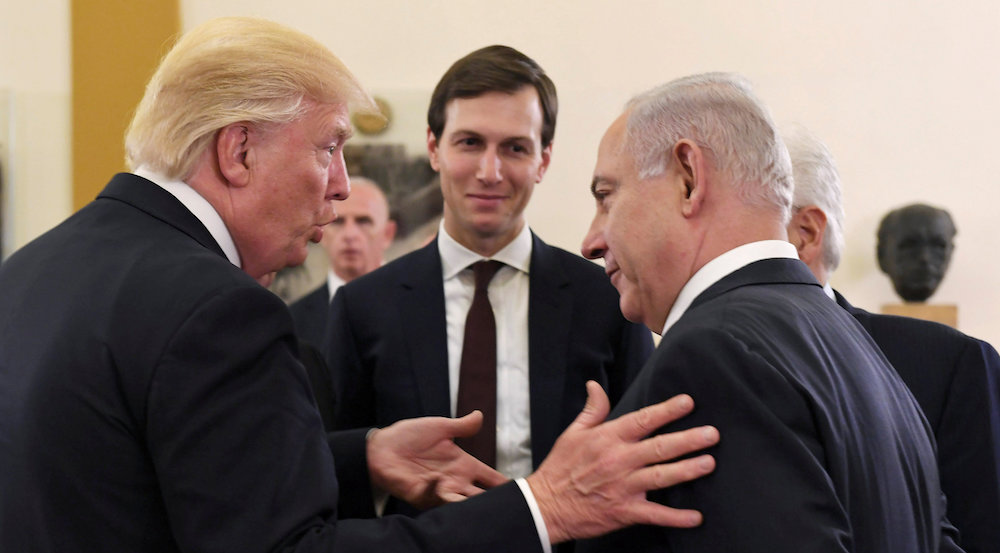 U.S. President Donald Trump and Israeli Prime Minister Benjamin Netanyahu chat as White House senior advisor Jared Kushner is seen in between them. Photo by Kobi Gideon/Courtesy of Government Press Office
U.S. President Donald Trump and Israeli Prime Minister Benjamin Netanyahu chat as White House senior advisor Jared Kushner is seen in between them. Photo by Kobi Gideon/Courtesy of Government Press Office If you needed more proof that history doesn’t follow a script, look to the Sept. 15 White House ceremony, celebrating treaties between Israel and the United Arab Emirates and Israel and Bahrain.
The timing is terrible. No one in Israel or the U.S. is interested in treaties. The virus takes away all the attention, with the remainder left for the November election. At a different time and under different circumstances, these treaties would make headlines around the world. But not today.
The players are also not the ones you would expect. You didn’t expect President Donald Trump or Prime Minister Benjamin Netanyahu to be peacemakers. They were supposed to play the role of enemies of peace — the anti-peacemakers. So what are they doing on the stage, signing documents? Where is the late Shimon Peres? Where is Bill Clinton? Where is the late Anwar Sadat?
And yet here they are, on stage, playing peacemakers and making speeches. This must be infuriating for their opponents. But history doesn’t follow a script. Sometimes things happen unexpectedly; initiated by unexpected players. This doesn’t make them good or bad.
For example: You receive a package. It is delivered by a rusty and noisy truck, carried by a driver who’s wearing a dirty shirt and smoking a cigarette. He’s rude and his truck drips oil on your driveway. But now the package is at your door. Do you like what’s in it? If you do, your disapproval of the delivery truck and its driver no longer matter.
This political package is a deal between Israel and two Arab countries who were not at war. So why should it be called a peace agreement? Because the basis of the Arab-Israel conflict is the notion — embraced for many years by almost all Arab countries — that Israel is an illegitimate entity in the Middle East. It is illegitimate for political reasons (Israelis are colonialists), or religious reasons (Israel is Jewish). Peace with Egypt in 1977 was so important because it put forth the idea that Israel is like all other countries in the region. You might disagree with it, you might even have a war over disagreements with it, but ultimately, when a specific dispute is resolved, you can have peace.
Jordan was the second country to accept Israel’s legitimacy and permanence. When peace with Jordan was signed in 1994, there was no real danger of war between the countries. Jordan was not seen as a military threat. And yet, signing a peace treaty signified a new state of mind — of coexistence. Like two normal countries living side by side. Like the U.S. and Mexico — not always best friends, not always in agreement, just neighbors, with all the ups and downs this entails.
Israel and the Gulf States are not neighbors. And yet, for decades, the Gulf States were members of the bloc of countries for whom Israel was considered a disruption. A thorn in need of removal. They were part of a bloc that refused see Israel as a permanent presence in the region. It was not war in any violent sense. But it was certainly not peace, and certainly not the normal relations between countries who have no shared borders but do have shared interests. Now these relations are becoming normal.
Of course, there are also many other benefits to having these normal relations. Beginning with the solidification of the coalition against Iran’s radical attempt to revolutionize the region, to having economic ties, to promoting tourism and personal ties. Normalcy is good. It is better than any fantasies conjured by the word “imagine.”
There are some observers who insist that this is not what they call a “peace” agreement (because there was no war). I think they are being petty. Their main interest is to make the achievement seem small. They do not want the rusty truck and the rude driver to get credit for delivering a worthy package.
In Israel, there are two groups who have misgivings about the agreements. The far right is upset, because peace comes with a price. In this case, a delay, or cancelation of annexation in the West Bank. The far left is upset because the peace doesn’t follow the prescribed script it was promoting for so many years. It is not focused on the Palestinians and was not delayed in an attempt to accommodate the Palestinians. In many ways it ignores the Palestinians.
Returning to the package metaphor: the rude driver delivered a package. It is a wonderful gift but not the one you expected. You can either enjoy the package you received and hope to get the other one at a later time, or you can feel miserable about getting the wrong wonderful gift.
It’s clear which path a good psychologist would recommend. But our imperfect nature makes such paths challenging. Our sages, not blind to human shortcomings, had advice for such moments. One of them, Ben Zoma, phrased it in the following way: “Who is rich? He who rejoices in his lot.”
More Jewish Journal articles on recent Middle East developments:
The Accidental Peace: How Big Is the UAE Deal? Shmuel Rosner
After UAE Deal, Will Liberal Zionists Stand on the Right Side of History? David Suissa
The U.S. Shepherds Israel, UAE and Bahrain to Peace: A Muslim’s Prayer for Selichot, Qanta A. Ahmed
UAE-Israel Pact: Sacrificing Substance for Ceremony? Martin Sherman
Also:























 More news and opinions than at a Shabbat dinner, right in your inbox.
More news and opinions than at a Shabbat dinner, right in your inbox.